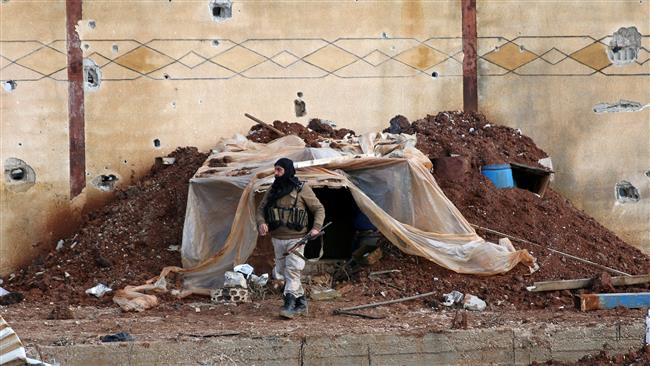Turkey needs Russia, Iran to fight threats: Pundit
Turkey has been the scene of terrorist bombings and attacks, which have escalated in recent weeks. On Thursday, an explosion struck near a courthouse in the western Turkish city of Izmir, leaving two people dead and several others wounded. Turkish authorities put the blame on Kurdish militants and the Daesh group. Ankara has allowed foreign-backed militants to infiltrate into Syria from its borders. Some analysts believe Turkey's support for militant groups has backfired. In recent months and especially after a failed coup on July 15, 2016, the government of President Recep Tayyip Erdogan has indicated signs of a policy shift, including through its cooperation with Russia to discuss a ceasefire in Syria.
Huseyin Bagci, a lecturer at the Middle East University from Ankara, says Turkey needs Russia and Iran to strengthen its ability in the alleged fight against Daesh in Syria.
“A strong Turkey with Iran and Russia will allow the Turks to act much more strongly militarily,” he told Press TV’s the “Debate” program on Thursday night.
Russia and Iran are temporary allies of Turkey to fight extremists and separatists active in Syria, he said, noting that the Turkish government is trying to fight Daesh and the Kurds, while Moscow and Tehran want to maintain the “territorial integrity” of the Arab country.
According to Bagci, Turkey is facing the challenge that Daesh is getting together with the Kurdistan Workers’ Party (PKK), adding Moscow is the most important ally to provide Ankara with the necessary help.
Turkey's foreign policy is shifting towards Moscow because the Russians have played a very strong role in the region and Turkish authorities have been disappointed with the policies of the US and certain European powers, he added.
Turkey, however, is not leaving EU negotiations or its military alliance with NATO members; rather, it is trying to find a getaway from the conflict in Syria, Bagci said.
According to the academic, Turkish foreign policy towards Syria has been full of “miscalculation”. He touched on a recent interview in which Deputy Prime Minister Veysi Kaynak said he belonged to those groups who have been thinking that Turkish foreign policy towards Syria was wrong from the very beginning.
“The general tendency in Turkey is its Syrian policy is a failure ... and Turkey is now trying to be more flexible and get an honorable exit from the wrong Syrian policy,” he said.
The Turks are starting to abandon the “regime change” policy against the Syrian government, he added.
Bagci went on to say that recent terrorist attacks in Turkey have prompted Ankara to review its policy towards extremists in Syria.
“These terrorist activities, as the government sources claim, come from outside and Turkey feels very unpleasant and disappointed at the moment to fight against Daesh,” he said.
The academic referred to the backlash from Turkey's support for extremist groups in Syria, saying Daesh is very dangerous because there are a lot of people within Turkey “who have sympathy for this terrorist organization” while "Daesh is saying publicly that Turkey is now the target country for their activities.”
Lawrence Davidson, lecturer at the West Chester University from Pennsylvania, said Turkey’s policies towards the Kurds and towards Syria have in fact created circumstances which have created a blowback.
He said both governments in Ankara and Damascus have mutual interests and that is the question of territorial integrity. President Assad, Bagci explained, wants to get back the whole of his country and President Erdogan prefers to prevent an autonomous Kurdish region in the neighboring state.
“A major long-term Turkish aim here is to destroy any Kurdish hopes of autonomous region or state in anywhere approximate to its borders,” the lecturer argued.
“The Turkish government realized at a certain point that a policy looking towards [Syrian President Bashar] Assad’s dismissal was not going to work,” he said.
To avoid the establishment of a Kurdish autonomy in Syria, the Turkish government has decided to negotiate with Russia and Iran over the situation in Syria, which is “a viable move” on the part of Ankara, he added.
“Turkey is at the table with Iran and Russia because Iran and Russia also have no objections to asserting territorial integrity of Syria and making the Syrian government sovereign over that territory,” Davidson stated.
South Korea says North launched several missiles off east coast
Israel kills 204th journalist in Gaza since October 2023
Trump would have been convicted if not reelected: Ex-US special counsel
Israeli media: Trump promises Netanyahu to violate nascent Gaza truce
VIDEO | Turning point: Aoun’s presidency in Lebanon
The impulse behind Iran-Russia strategic partnership
Israeli radio: Emerging Gaza ceasefire deal ‘complete failure’ for regime
VIDEO | Press TV's News Headlines













 This makes it easy to access the Press TV website
This makes it easy to access the Press TV website